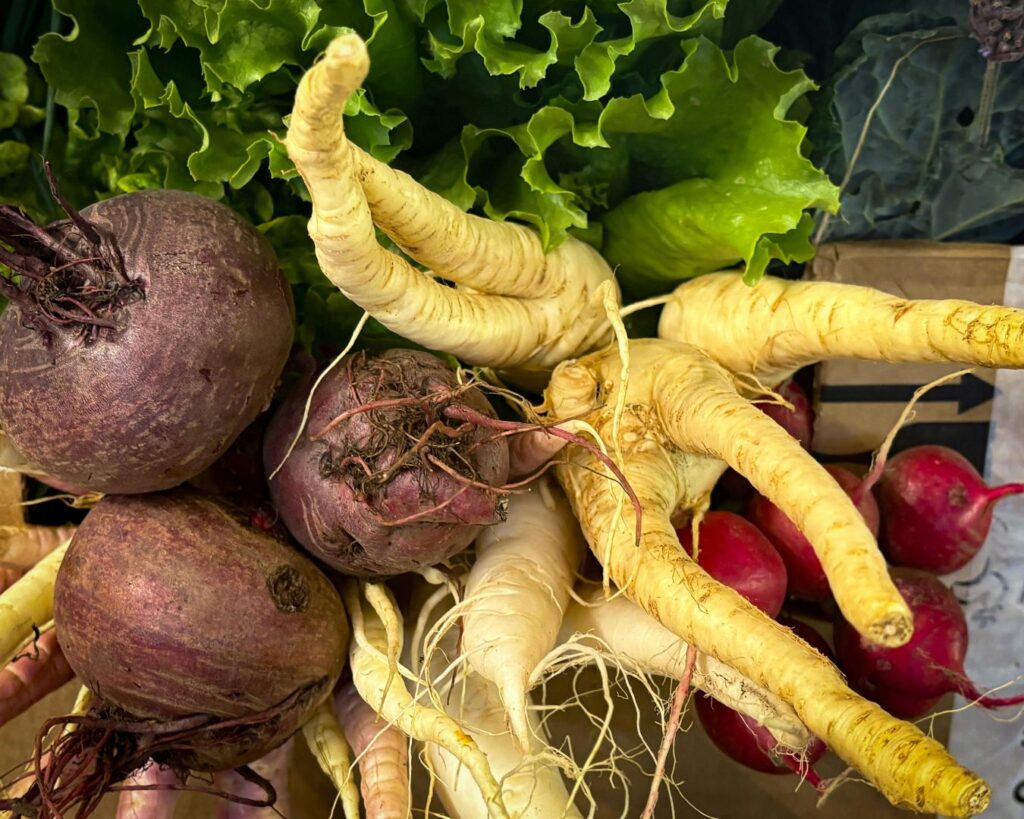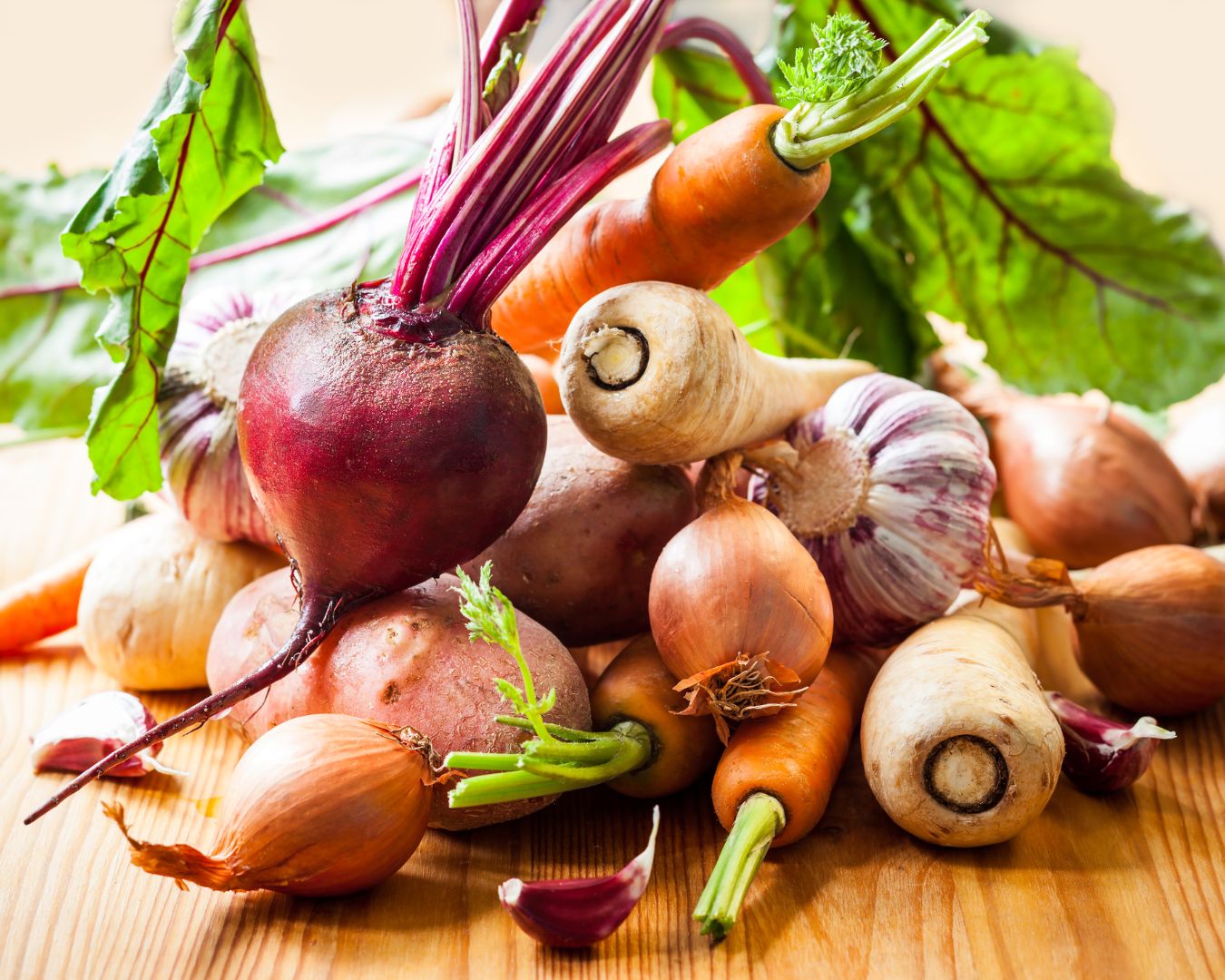Nutritional Benefits of Root Vegetables
Root vegetables are the unsung heroes of the vegetable world. Growing underground, these nutrient-packed powerhouses absorb minerals from the soil, making them rich in vitamins, minerals, and fiber. From the vibrant orange of carrots to the deep purple of beets, root vegetables offer a wide array of health benefits. In this blog post, we’ll explore the nutritional value of some popular root vegetables like carrots, beets, and parsnips, and why you should consider incorporating them into your diet.
Carrots: A Vision-Boosting Vegetable
Nutritional Highlights:
- Beta-Carotene: Carrots are famously rich in beta-carotene, an antioxidant that the body converts into vitamin A. This vitamin is essential for good vision, immune function, and skin health.
- Fiber: A single medium carrot provides about 1.7 grams of dietary fiber, which supports digestive health and helps maintain stable blood sugar levels.
- Vitamin K1: Carrots are also a good source of vitamin K1, which plays a role in blood clotting and bone health.
- Potassium: This mineral helps regulate blood pressure and supports overall cardiovascular health.
Health Benefits:
- Improved Vision: The high beta-carotene content in carrots helps maintain healthy eyesight and may reduce the risk of age-related macular degeneration.
- Heart Health: The fiber and potassium in carrots contribute to heart health by helping to manage cholesterol levels and blood pressure.
- Digestive Support: Carrots are rich in dietary fiber, which promotes regular bowel movements and supports gut health.

Beets: A Heart-Healthy Powerhouse
Nutritional Highlights:
- Nitrates: Beets are known for their high nitrate content, which the body converts into nitric oxide. This compound helps relax blood vessels and improve blood flow.
- Folate: Beets are an excellent source of folate, a B-vitamin that is crucial for DNA synthesis and repair, making it important for cell growth and function.
- Vitamin C: This antioxidant vitamin supports the immune system and promotes healthy skin by aiding collagen production.
- Fiber: Like other root vegetables, beets are high in fiber, which aids digestion and supports a healthy gut.
Health Benefits:
- Blood Pressure Management: The nitrates in beets have been shown to lower blood pressure, reducing the risk of heart disease and stroke.
- Enhanced Athletic Performance: Nitric oxide from beet nitrates can improve blood flow and oxygen delivery to muscles, enhancing athletic performance.
- Detoxification: Beets contain compounds called betalains, which support liver function and aid in detoxification.
Parsnips: A Fiber-Rich and Nutrient-Dense Vegetable
Nutritional Highlights:
- Fiber: Parsnips are particularly high in dietary fiber, with one cup providing nearly 7 grams. This helps with digestion and maintaining stable blood sugar levels.
- Vitamin C: Parsnips are a good source of vitamin C, which supports immune function and acts as an antioxidant.
- Folate: Like beets, parsnips are rich in folate, making them important for DNA synthesis and overall cell function.
- Potassium: This mineral in parsnips supports heart health by regulating blood pressure and preventing hypertension.
Health Benefits:
- Digestive Health: The high fiber content in parsnips aids in digestion, prevents constipation, and promotes a healthy gut microbiome.
- Immune Support: Vitamin C in parsnips helps boost the immune system and protect against illnesses.
- Bone Health: Parsnips provide a good amount of vitamin K, which is essential for bone health and helps prevent osteoporosis.

Other Notable Root Vegetables
- Sweet Potatoes: Packed with vitamins A and C, fiber, and potassium, sweet potatoes are excellent for vision, immune support, and heart health.
- Turnips: Rich in vitamin C, fiber, and potassium, turnips support immune function, digestive health, and cardiovascular health.
- Radishes: Low in calories but high in vitamin C and fiber, radishes are great for boosting immunity and aiding digestion.
Incorporating Root Vegetables into Your Diet
Root vegetables are incredibly versatile and can be used in a variety of dishes. Here are some ideas:
- Roasting: Roast a mix of carrots, parsnips, and beets with olive oil, garlic, and herbs for a delicious side dish.
- Soups and Stews: Add root vegetables to soups and stews for extra flavor, texture, and nutrition.
- Salads: Grate raw carrots or beets into salads for a crunchy, nutrient-dense addition.
- Purees: Puree cooked root vegetables with a bit of butter and seasoning for a creamy, comforting dish.
- Snacks: Slice carrots, parsnips, or radishes into sticks and pair them with hummus or yogurt-based dips for a healthy snack.
Root vegetables are a nutritional powerhouse, offering a wealth of vitamins, minerals, and fiber that contribute to overall health and well-being. Whether you’re looking to improve your vision, support heart health, or enhance your digestive system, incorporating a variety of root vegetables into your diet is a delicious and effective way to achieve these goals. So next time you’re at the grocery store or farmer’s market, be sure to stock up on these underground gems and start reaping their many benefits.

